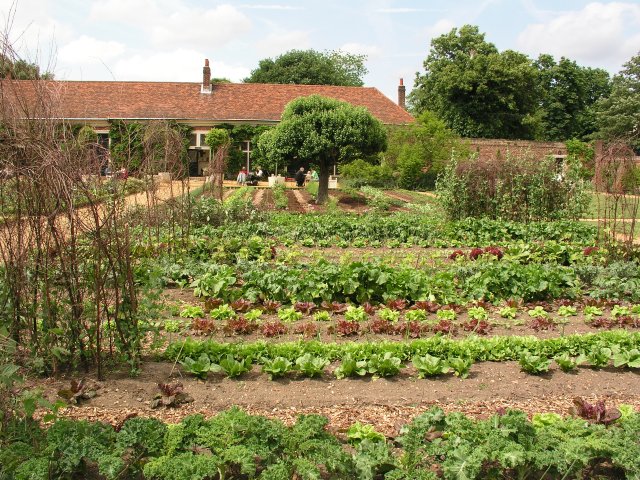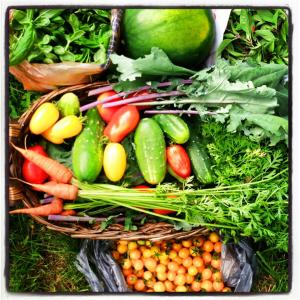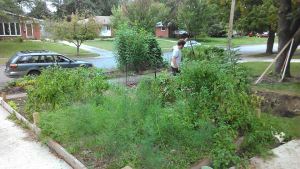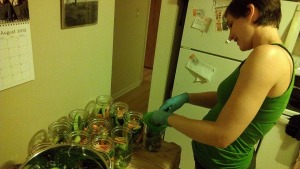This post is adapted from the original on my (now-defunct) personal blog “Strange Branches.” If you live in Zone 5-7 in the US (see map), this is a good time to buy seeds and seedlings to start your garden, so I thought I’d give you a gentle nudge.
For the past four years now, my partner Jen and I have been helping our friends Liz and Kevin (the co-founder of this blog) build a pretty respectable vegetable garden at their house a little ways outside downtown Ann Arbor, Michigan. In some ways, this story couldn’t be simpler: we worked the soil, planted some of our favorite crops, and harvested some nice, fresh vegetables. Yet cultivating this practice has shifted my worldview in ways I would never have anticipated.
The Transcendence of the Garden
Before we get to any of that, allow me a moment to gush. The fresh air, the feeling of accomplishment watching the garden come alive, and the bounty of food (oh my god, the food) come together to make vegetable gardening the most gratifying hobby I’ve ever taken up, by far. Afternoons of friends, music, beers and meandering conversations in the sun yield a basket of fresh, peppery basil and juicy, purple, lusty tomatoes. Did I mention “oh my god, the food?” Supermarket vegetables taste like cardboard by comparison.
Gardening solo, by contrast, is a time to slow down, meditate, unplug from modern life and gain a respect for the pace and ways of plants. Sprouting, laying roots, harvesting the sun, deterring pests, attracting pollinators, setting fruit, dying. It’s a romantic endeavor, and forces you to see a little patch of the world in a slow, deliberate way that is sorely lacking in 2014. Gardening reminds you that you are an embodied human with needs (for sustenance, for vitamins), and that you can meet those needs by meeting the needs of some very different embodied organisms, your plants. It’s a miracle so fundamental that, as Michael Pollan points out, it is deeply subversive: the Tree of Knowledge may be just that.
Simpler Times
I am clearly not the first person who’s found solace in tending some land and hearkening back to simpler times. Like many of us trying to keep pace in this frenetic, confusing and unmoored modern society, a kind of existential restlessness serves as a foundation for my daily experience. I am bombarded daily by a surfeit of possible programs for living, all digested and delivered to me at an uncomfortable pace by the information intestine that is the internet. Consumer culture has left me feeling cut off from an understanding the value or production of the material things which keep me alive and with which I’m encouraged to identify.
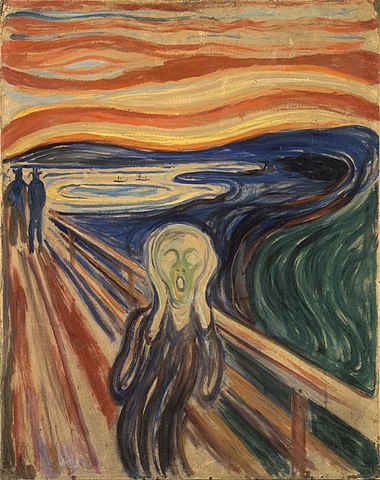
Crushed by the world!
So all pretty much par for the course and completely in line with the zeitgeist. There’s a whole subculture built up around these feelings, also available digested and delivered at an uncomfortable pace by the internet. But just because it’s a fad doesn’t mean that there isn’t real value there.
Plants capture the energy of the sun and produce the sugars, starches, fats, and proteins on which we all depend, and the tastes, smells and drugs in which we all delight. We get so caught up in the bustle and noise of human society, we forget that this is and has been the global machinery powering life on earth. While we fuel ourselves by burning down the partially digested plants of eras past, this powerful evolved apparatus continues to grind on at its own glacial pace. Being with it for a moment has a spiritual depth that was surprising to me at first, and then deeply unsurprising.
Your small patch of land matters
If this life-sustaining biological machinery goes too far off track, none of our other tales are going to have a happy ending. The industrial farming system that supplies most of your food has done an impressive job of maximizing efficiency of labor and dollar cost by relying on a few monoculture crops, sprayed with pesticides, fertilized, and harvested with machines. But that efficiency comes at an enormous cost in negative externalities as pesticides seep into our ecosystems, and fertilizers run off into our rivers and lakes, causing massive algae blooms and fish kills.
Much of our current industrial agriculture system relies on rapidly drawing down the reserves of energy and nutrients that have slowly accumulated by biological and geological action over the history of earth. Our bank of nutrient-rich topsoil, built up over millions of years, is washing into the sea. We burn enormous amounts of fossil fuels making nitrogen fertilizer from thin air, mining dwindling reserves of phosphorus from the earth, and running enormous tractors and combines. Without getting too apocalyptic, let’s just say we could be doing this food thing better.
Organic gardening hold promise to address many of these problems. As the (admittedly whimsical) saying goes, a bad farmer grows weeds, a good farmer grows crops, and a great farmer grows soil. Growing soil is an idea completely alien to the pace of our society, but it’s vitally important.
Obviously, one garden makes an infinitesimally small contribution to food production, but it can substantially supplement your weekly groceries. Further, gardening can really open your eyes to the problems in the food system; you can educate yourself quite a bit about how agriculture works, from pest management to soil conditioning. You can see for yourself, on an understandable scale, how practices like companion planting, crop rotation, and composting can lead to bountiful yields without resorting to the tools of industrial agriculture.
Importantly, setting up a vegetable garden sends a highly visible message that there are viable, healthy, alternative ways to use your land. Our current agricultural practices threaten our ability to produce enough food for our grandchildren. The kinds of reductionistic quick fixes we often resort to to solve our problems are unlikely to help much against problems so global, complex, and interconnected; system-level solutions like organic farming are a better bet. Your small patch of land matters.
A lot of people use their land to grow grass, and that can be great, too. Badminton, barbeques, outdoor parties, little kids running around: all immensely improved by a well-tended lawn. However, we now use three times more land in the U.S. for lawns than for corn, and lawns have an environmental cost of decreased biodiversity and increased use of pesticides and fertilizers. All those lawns add up.

The aesthetic of a closely-cropped lawn, whatever its origins – probably European aristocracy showing off how much land they could not grow food on – became firmly fixed in the ’50s as a symbol of America. Everyone tends their own yard, and you have a nice, tidy, orderly neighborhood. I can see why people are into that, and I don’t want to add to the culture war or suggest that you’re single-handedly destroying the planet if you love your lawn. But if you don’t care that much one way or another, you should consider a native flower garden, mulch and trees, or a vegetable garden. You might be surprised by what you learn – about your food, about your environment, and about yourself.
P.S: If you are interested in growing your own vegetable garden, buy this book.
References:
Hayes, Tyrone, et al. “Atrazine-induced hermaphroditism at 0.1 ppb in American leopard frogs (Rana pipiens): laboratory and field evidence.” Environmental Health Perspectives 111.4 (2003): 568. DOI
Reganold, John P., Lloyd F. Elliott, and Yvonne L. Unger. “Long-term effects of organic and conventional farming on soil erosion.” Nature 330.6146 (1987): 370-372. DOI

